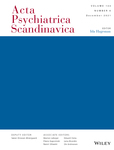Online peer-delivered group cognitive-behavioral therapy for postpartum depression: A randomized controlled trial
Abstract
Background
Postpartum depression (PPD) affects up to one in five mothers and birthing parents, yet just 10% receive evidence-based care. This randomized controlled trial aimed to determine if a synchronous online 9-week group cognitive-behavioral therapy (CBT) intervention delivered by mothers who have recovered from postpartum depression (i.e., peers) could effectively improve PPD and its comorbidities.
Methods
Participants (n = 183) in this study lived in Ontario, Canada, were ≥18 years-old, had an infant <12 months, were fluent in English, and scored ≥10 on the Edinburgh Postnatal Depression Scale (EPDS). They were randomized to experimental (received intervention plus treatment as usual (TAU)) or waitlist control (TAU plus the intervention after a 9-week wait) groups. Depression, anxiety, social support, mother-infant bonding, and infant temperament were assessed at baseline and 9 weeks later. Outcomes were assessed in the experimental group 3 months post-intervention to assess stability.
Results
Statistically significant reductions were observed in EPDS (B = 5.99; p < 0.001; d = 1.32) and Generalized Anxiety Disorder Questionnaire-7 scores (B = 5.94; p < 0.001; d = 1.22), improvements that remained stable 3 months post-intervention in the experimental group. Maternal social support (p = 0.02; d = 0.40), infant-focused anxiety (p = 0.02; d = 0.54), and infant negative emotionality (p < 0.01; d = 0.23) also improved post-intervention and remained stable 3 months later.
Conclusion
Online peer-delivered group CBT for PPD can effectively treat PPD and anxiety, and improve social support, infant-focused anxiety, and negative emotionality in infants. This intervention could provide the means to increase access to treatment for those experiencing PPD and improve outcomes for mothers, birthing parents, and families.

 求助内容:
求助内容: 应助结果提醒方式:
应助结果提醒方式:


